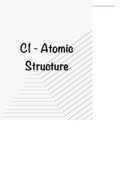C1 atomic structure - Study guides, Class notes & Summaries
Looking for the best study guides, study notes and summaries about C1 atomic structure? On this page you'll find 44 study documents about C1 atomic structure.
Page 4 out of 44 results
Sort by
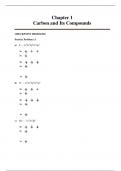
-
Solution Manual for Organic Chemistry Mechanistic Patterns Canadian 1st Edition Ogilvie Ackroyd Br
- Exam (elaborations) • 809 pages • 2024
-
- $47.69
- + learn more
Chapter 1 Carbon and Its Compounds CHECKPOINT PROBLEMS Practice Problem 1.1 a) S — 1s2 2s2 2p6 3s2 3p4 b) Cl — 1s2 2s2 2p6 3s2 3p5 c) Na+ — 1s2 2s2 2p6 1-2 Copyright © 2018 Nelson Education Limited Practice Problem 1.2 a) Count valence electrons. Build a basic bonding framework and account for electrons used. Add remaining electrons and check for formal charges. The molecule has a lone pair on the nitrogen. All other electrons are bonding electrons. b) Count valence...
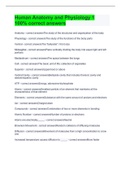
-
Human Anatomy and Physiology 1 100% correct answers
- Exam (elaborations) • 9 pages • 2022
- Available in package deal
-
- $8.49
- + learn more
Human Anatomy and Physiology 1 100% correct answersAnatomy The study of the structures and organization of the body Physiology The study of the functions of the body parts Ventral The "bellyside" / front size Midsagittal Plane vertically dividing the body into equal right and left portions Mediastinum The space between the lungs Cell The basic unit of life; collection of organelles Superior Uppermost or above Ventral Cavity Bel...
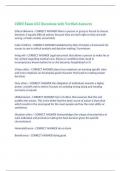
-
CRRN Exam 652 Questions with Verified Answers,100% CORRECT
- Exam (elaborations) • 80 pages • 2024
-
- $13.99
- + learn more
CRRN Exam 652 Questions with Verified Answers Ethical dilemma - CORRECT ANSWER When a person or group is forced to choose between 2 equally difficult actions because they are both right or they are both wrong, or both contain uncertainty Code of Ethics - CORRECT ANSWER Established by ANA; Provides a framework for nurses to use in ethical analysis and decision making; 9 provisions living will - CORRECT ANSWER Legal document that allows a person to make his or her wished regarding medical...
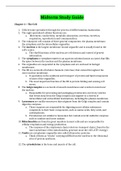
-
Midterm Study Guide
- Exam (elaborations) • 31 pages • 2022
-
- $15.69
- + learn more
Midterm Study Guide Chapter 1—The Cell 1. Cells become specialized through the process of differentiation/maturation. 2. The eight specialized cellular functions are: a. Movement, conductivity, metabolic absorption, secretion, excretion, respiration, reproduction and communication. 3. The eukaryotic cell consists of three general components: the plasma membrane, the cytoplasm and the intracellular organelles. 4. The nucleus is the largest membrane-bound organelle and is usually foun...
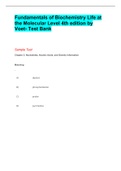
-
Fundamentals of Biochemistry Life at the Molecular Level 4th edition by Voet- Test Bank
- Exam (elaborations) • 37 pages • 2022
-
- $15.49
- + learn more
Fundamentals of Biochemistry Life at the Molecular Level 4th edition by Voet- Test Bank Sample Test Chapter 3: Nucleotides, Nucleic Acids, and Genetic Information Matching A) diploid B) phosphodiester C) probe D) pyrimidine E) introns F) cloning G) transformed H) exons I) ampicillin J) autoradiography K) chain-terminator L) purine M) ester 1. Cytosine, uracil, and thymine are derivatives of . Ans: ...
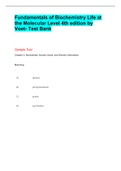
-
Fundamentals of Biochemistry Life at the Molecular Level 4th edition by Voet- Test Bank
- Exam (elaborations) • 37 pages • 2022
-
- $14.49
- + learn more
Fundamentals of Biochemistry Life at the Molecular Level 4th edition by Voet- Test Bank Sample Test Chapter 3: Nucleotides, Nucleic Acids, and Genetic Information Matching A) diploid B) phosphodiester C) probe D) pyrimidine E) introns F) cloning G) transformed H) exons I) ampicillin J) autoradiography K) chain-terminator L) purine M) ester 1. Cytosine, uracil, and thymine are derivatives of . Ans: ...
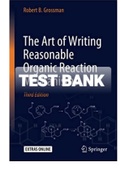
-
Exam (elaborations) TEST BANK FOR The Art of Writing Reasonable Organic Reaction Mechanisms 3rd Edition By Grossman
- Exam (elaborations) • 237 pages • 2021
-
- $15.49
- + learn more
Exam (elaborations) TEST BANK FOR The Art of Writing Reasonable Organic Reaction Mechanisms 3rd Edition By Robert B. Grossman (Solution Manual) sp2 hybridization. One of the lone pairs is in a p orbital, and the other is in an sp2 orbital. Only the lone pair in the p orbital is used in resonance. 1.5. (a) No by-products. C(1–3) and C(6–9) are the keys to numbering. (b) After numbering the major product, C6 and Br25 are left over, so make a bond between them and call it the by-product....
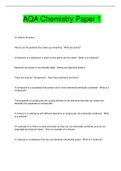
-
AQA Chemistry Paper 1
- Exam (elaborations) • 30 pages • 2022
-
- $12.49
- + learn more
C1 Atomic Structure Atoms are the particles that make up everything - What are atoms? An element is a substance in which all the atoms are the same - What is an element? Elements are shown in the Periodic table - Where are elements shown? There are around 118 elements - How many elements are there? A compound is a substance that contain two or more elements chemically combined - What is a compound?
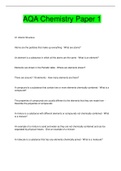
-
AQA Chemistry Paper 1
- Exam (elaborations) • 30 pages • 2022
-
- $12.49
- + learn more
C1 Atomic Structure Atoms are the particles that make up everything - What are atoms? An element is a substance in which all the atoms are the same - What is an element? Elements are shown in the Periodic table - Where are elements shown? There are around 118 elements - How many elements are there? A compound is a substance that contain two or more elements chemically combined - What is a compound?
GCSE AQA CHEMISTRY SEPARATE SCIENCE ATOMIC STRUCTURE

How did he do that? By selling his study resources on Stuvia. Try it yourself! Discover all about earning on Stuvia



